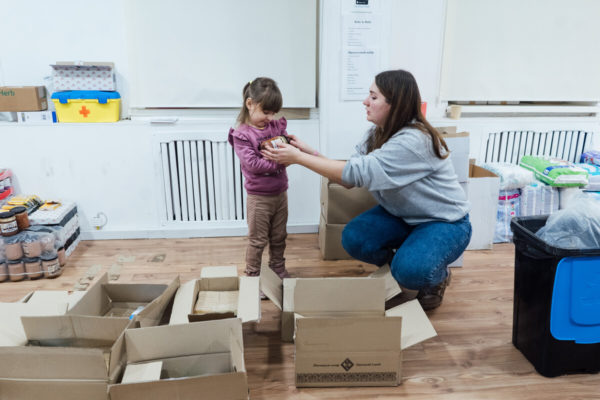Thanks to the generous support of ActionAid supporters, Insight has supported over 14,000 displaced families with essential humanitarian relief packages, including food, clothing, and water, and provided mental health support for women and girls affected by the conflict.
In times of crisis, like war, women and girls face a much higher risk of gender-based violence, including domestic violence. Volunteers with Insight, like Veronika, have been instrumental in supporting countless women to get out of difficult situations with their husbands.
Veronika’s story
Before the war, Veronika worked in a special educational needs school. The first few months of the war were extremely challenging for her and her family as they were forced to give up the lives and home they had built for themselves in Kharkiv.
“I was just a completely happy person before the war. I had my dream job – a social teacher at a school for children with special educational needs. I had a very happy life.”
When the invasion started, Veronika says her first thoughts were not of her own safety, but of the children at her school.
“When I woke up on 24 February, the first question was not about my safety, but of the children at the school. The city was under constant shelling. The planes were flying all the time. You just see everything in the smoke, in the black smoke, because there will be constant bombing there.”
In the first week, Veronika and her family stayed in their flat, going down to the apartment block’s basement every day. However, with 30 people in a space of around 2X2m, it wasn’t something they could continue to do.
After her family were forced to flee Kharkiv, her daughter developed a tooth ache. With medicines and everything else being in short supply, they moved to Lviv where they spent the last of their money on a dentist to relieve their child.
In Lviv, Veronika discovered Women’s March and Insight, finding both a safe space and a sense of purpose and empowerment. She feels like her work with Insight has helped her to feel part of something big, working every day with women to help them overcome challenges.

Veronika, a volunteer at Insight NGO, an ActionAid partner, with her daughter Daniela at the Insight Hub.
“Both Insight and the Women’s March are my mental health. They lifted me off my knees. I went there every day, and there were people who told me: “Veronika, this is not a job. Why are you coming here [every day]?” I realised why I was doing it – I came there whenever I needed.”
“I am here, and I am helping. It inspires me every day. I know that we are something more. Not just a woman who has to raise a child and cook at home for my husband’s meals. I am a woman who can help, who wants to help, who wants to be involved in something big – a big cool thing.”
By volunteering with Insight, Veronika has found purpose, and her husband is now looking after their child while she works, something that feels new and powerful to her.
Veronika told us how everything has changed, and in the year since the invasion began, her husband has become a feminist. She explained how he told sexist jokes every day but now he helps with the efforts at Insight, he “now realises that a woman is much more.”
How the international response to the war in Ukraine is failing women?
The protection of women and girls has been forgotten in the international response to the crisis. Recent research by ActionAid revealed that women’s organisations from Ukraine and the region, as well as gender and women’s rights issues, were absent from the 2022 international conferences in Switzerland and Germany on Ukraine’s Recovery. Yet, women like Veronika, are on the frontlines working with women’s organisations in Ukraine and neighbouring countries to meet the needs and rights of women and children displaced by the conflict.
ActionAid is calling for the international response to the Russian invasion of Ukraine to prioritise women, girls, and marginalised communities. We are demanding international action on:
- Protecting the rights, safety and wellbeing of women and children, LGBTQI+ communities and Ukrainian Roma populations;
- Meaningful Inclusion of women and girls, young people, and marginalised groups like the LGBTQIA+ community in all decision-making processes to guarantee that their leadership, rights and needs are at the centre of the humanitarian response and its aftermath;
- Holding perpetrators of gender-based violence and conflict-related sexual violence accountable.
As women and girls affected by the conflict face escalating threats of sexual and gender-based violence, it is vital that urgent support is provided to local women’s organisations to set up safe spaces, provide mental health counselling and skills training for displaced women and girls.